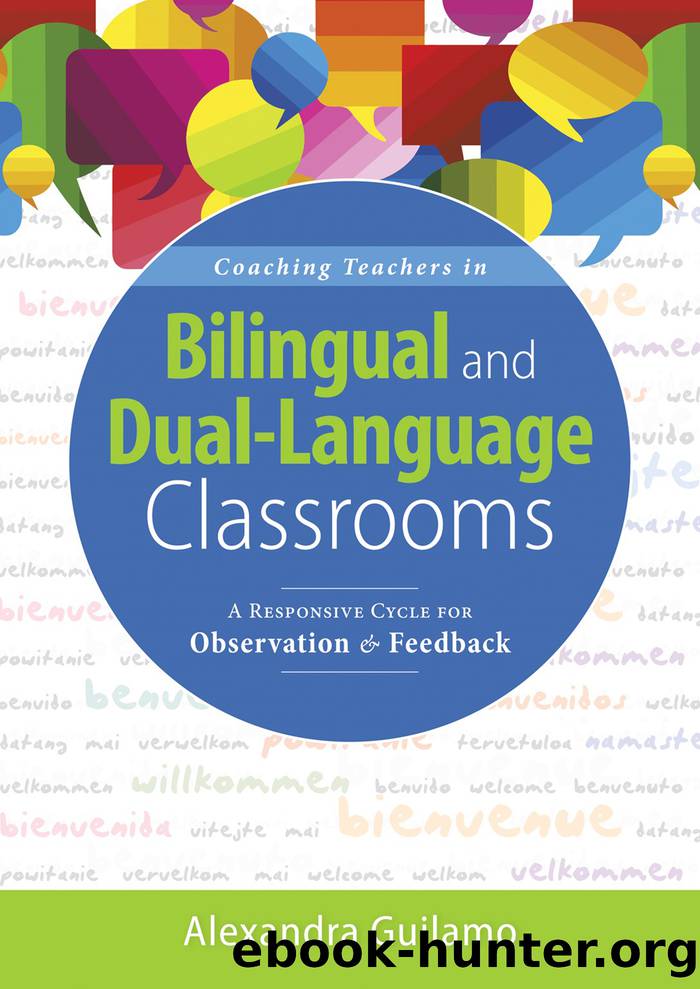Coaching Teachers in Bilingual and Dual-Language Classrooms by Guilamo Alexandra;

Author:Guilamo, Alexandra;
Language: eng
Format: epub
Publisher: Solution Tree
Published: 2019-08-15T00:00:00+00:00
Six Tasks of Notice as Tools for Collecting Evidence
The six tasks of notice are a method Iâve devised for coaches to document whatâs occurred during an observation, especially when observing a lesson delivered in a language that the coach does not fully know. For many coaches, this process is generally known as collecting evidence. The exercises that comprise these six tasks of notice, which I refer to as noticings, decrease the strain of observing in another language. I designed them to help coaches employ a more responsible and honest approach than relying on intuition or simply âknowingâ when good instruction is happening. Instead, these noticings train coaches to pay careful attention and accurately detect the effectiveness of teacher practices or actions and the more complex relationship among planning, instructional delivery, instructional adjustments, and student success.
Coaches should understand the following about the six tasks of notice.
⢠They do not involve scripting: Since coaches may not speak the language of the classroom, scripting requires too much guesswork. Instead of grounding observations and feedback in a script that relies on more guesses than certainties, coaches anchor observation and feedback cycles using four essential questions and six tasks of notice. They are structured to guide the process to a constructive path of improvement focused on studentsâ individualized and program goals. By collaborating on the interpretation of each task of notice, coaches can provide more accurate and helpful steps than any broken script ever could.
⢠They are aligned to all major teacher evaluation frameworks but designed to move beyond those frameworks to help coaches understand complex issues of culture, identity, and language that affect student learning outcomes: Careful attention to the six tasks of notice can help a coach accurately detect evidence of inequities in the classroom. While this knowledge may lead to uncomfortable conversations with the teacher being observed, coaches must trust that evidence and begin the process of coaching with that evidence rather than fall back on another component in other teacher evaluation frameworks.
⢠Teachers should use them together with the essential questions: The six tasks of notice help coaches with the structured attention and accurate detection needed while observing bilingual and dual-language classrooms. However, coaches also need to analyze the evidence collected through these six tasks of notice. This analysis of evidence, together with the essential questions, will help coaches focus on what needs to improve. The six tasks of notice and the essential questions serve as two complementary components of the observation and feedback cycle. Their interrelationship increases the likelihood that the changes recommended by the coach will lead to improved outcomes for students. Only through this approach will coaching feedback maintain a parallel focus on realtime student learning and long-term program effectiveness.
Table 6.1 provides coaches with an overview of the four essential questions and six tasks of notice.
Table 6.1: Four Essential Questions and Six Tasks of Notice
Four Essential Questions
Six Tasks of Notice
Download
This site does not store any files on its server. We only index and link to content provided by other sites. Please contact the content providers to delete copyright contents if any and email us, we'll remove relevant links or contents immediately.
| Administration | Assessment |
| Educational Psychology | Experimental Methods |
| History | Language Experience Approach |
| Philosophy & Social Aspects | Reform & Policy |
| Research |
The Art of Coaching Workbook by Elena Aguilar(51160)
Trainspotting by Irvine Welsh(21643)
Twilight of the Idols With the Antichrist and Ecce Homo by Friedrich Nietzsche(18622)
Fangirl by Rainbow Rowell(9228)
Periodization Training for Sports by Tudor Bompa(8253)
Change Your Questions, Change Your Life by Marilee Adams(7758)
This Is How You Lose Her by Junot Diaz(6877)
Asking the Right Questions: A Guide to Critical Thinking by M. Neil Browne & Stuart M. Keeley(5757)
Grit by Angela Duckworth(5604)
Red Sparrow by Jason Matthews(5466)
Paper Towns by Green John(5177)
Room 212 by Kate Stewart(5105)
Ken Follett - World without end by Ken Follett(4723)
Housekeeping by Marilynne Robinson(4436)
The Sports Rules Book by Human Kinetics(4379)
Papillon (English) by Henri Charrière(4262)
Double Down (Diary of a Wimpy Kid Book 11) by Jeff Kinney(4261)
The Motorcycle Diaries by Ernesto Che Guevara(4089)
Exercise Technique Manual for Resistance Training by National Strength & Conditioning Association(4061)
